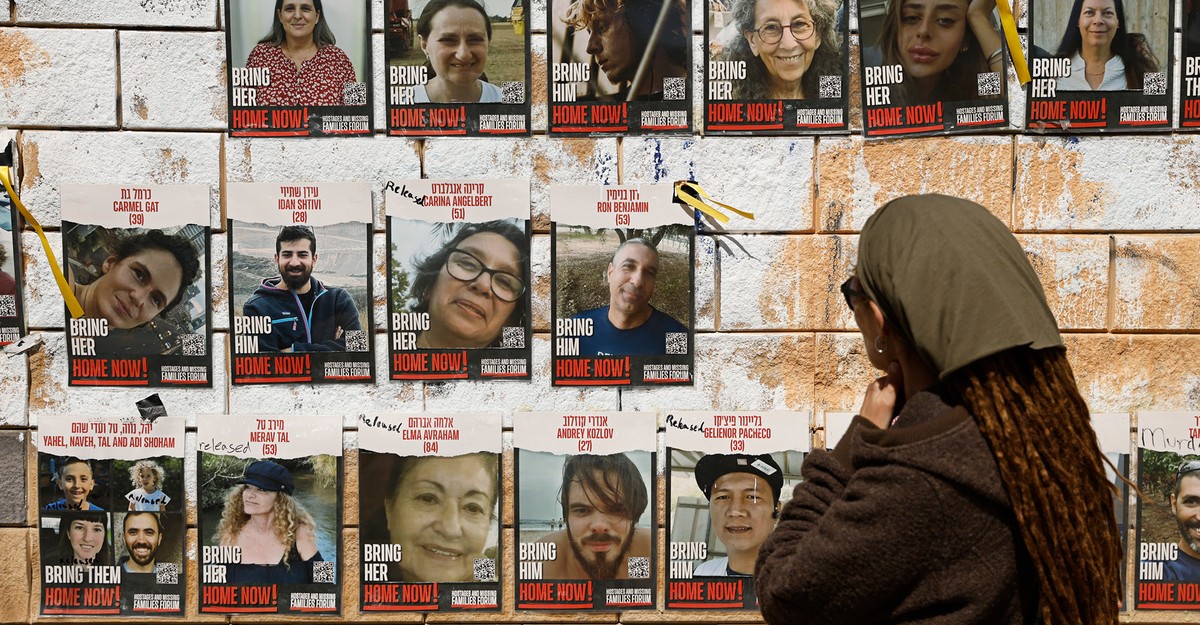Reading too much into the language seems, at this point, to be less of a danger than reading too little into it.
This week, Israel released an appalling video featuring five female Israeli soldiers taken captive at Nahal Oz military base on October 7. Fearful and bloody, the women beg for their lives while Hamas fighters mill around and alternately threaten to kill them and compliment their appearance. The captors call the women “sabaya,” which Israel translated as “women who can get pregnant.” Almost immediately, others disputed the translation and said sabaya referred merely to “female captives” and included no reference to their fertility. “The Arabic word sabaya doesn’t have sexual connotations,” the Al Jazeera journalist Laila Al-Arian wrote in a post on X, taking exception to a Washington Post article that said that it did. She said the Israeli translation was “playing on racist and orientalist tropes about Arabs and Muslims.”
These are real women and victims of ongoing war crimes, so it does seem excessively lurid to suggest, without direct evidence, that they have been raped in captivity for the past several months. (“Eight months,” the Israelis noted, allowing readers to do the gestational math. “Think of what that means for these young women.”) But to assert that sabaya is devoid of sexual connotation reflects ignorance, at best. The word is well attested in classical sources and refers to female captives; the choice of a classical term over a modern one implies a fondness for classical modes of war, which codified sexual violence at scale. Just as concubine and comfort woman carry the befoulments of their historic use, sabaya is straightforwardly associated with what we moderns call rape. Anyone who uses sabaya in modern Gaza or Raqqah can be assumed to have specific and disgusting reasons to want to revive it.



I’m just going to copy & paste my response from an earlier post:
Never thought knowing Palestinian Arabic could become so useful. Sabaya is a very normal word to use for youngish women. Maybe in high Arabic it is a more specific term but in every day language no one in their right mind would think about anything related to pregnancy, that’s just ridiculous. Maybe it’s implied, just like it’s implied in “girl” or “young woman”, but that’s just a very desperate attempt to make it sound more than it actually is.
More background:
In Fusha (high Arabic) there are allegedly like 50 different names for a camel depending on what it’s up to. E.g. it has a different name when it’s drinking, sitting, pregnant, young, old, … very similar to cattle terminology in English: https://en.m.wikipedia.org/wiki/List_of_cattle_terminology
Why I’m mentioning this isn’t because I want to equate women to cattle (please don’t read this out of my comment, that’s not at all what I’m saying just to be very clear). I’m saying it because Arabic is a very rich and complex language. I really don’t know much about Fusha but it can very well be that sabaya means something more specific there in terms of what kind of women these sabaya are exactly. Anyway, even if that were the case in every day language no one would actually try to specifically mention that some woman is capable of getting pregnant.
Connotation also matters. Sabaya (or saby for short) was a specific term that ISIS used to refer to their female sex slaves.
https://lemmy.world/comment/10288666
It doesn’t matter what ISIS used because this isn’t ISIS. I speak Palestinian Arabic and صبايا means girls end of story. There’s nothing to argue about especially since you don’t even seem to speak Arabic.
Yes it does. Hamas isn’t some benevolent force of freedom fighters. The language and ideology of ISIS and Hamas are one and the same.
Sabaya سبايا has a specific meaning in the context and culture in which is was used. That meaning was used to degrade and frighten the captives. It’s by no means a stretch of the imagination to believe this
All of this is irrelevant because the guy did not use the word you’re talking about and that’s why it doesn’t make sense to argue with you.
You need to be able to speak the language to be able to distinguish between the letters ص and س.
Since you don’t speak the language you can’t hear the difference and I don’t know why you’re still trying to desperately cling onto this BS propaganda.
Best I can tell, other native Arabic speakers do not agree with what you say.
Video Mirror
Source: x.com
Yeah, try again.
Would you accept a reputable long form publication?
Lmao this is just sad.
Arabic has lots of dialects. English has lots of dialects.
If a British person wants to “bum a fag” they want to cheeky “borrow” a cigarette. If an American wants to “bum a fag” they are using offensive terms for homosexual sex.
Dialects matter.
What do you hear?
Video Mirror